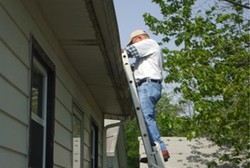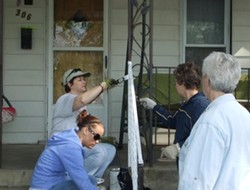The Rev. Joel Adams graduated from seminary with what he knew were good ideas — he just didn’t know if they would work or not. When he was called to serve as pastor of First Presbyterian Church of Olney, Ill., he had the opportunity to try them out.
“First Presbyterian was a traditional, small rural church — the previous pastor had been there for 32 years, and church was what you did on Sunday,” explained Adams of the congregation in southern Illinois. “Serving meant hanging greens at Christmas, fixing things at church, or helping at the men’s breakfast.”
Adams, along with the church’s leadership, sensed it was time to do something different — they just weren’t entirely sure what that might be.
So Adams started asking questions: Where do you hear God? Where do you see God? What would be your dreams and hopes for this church? It was language, he soon found out, that was not entirely accepted in a small rural town.
“This was back around 2003, so the word missional wasn’t really big at all back then and people didn’t really know what it meant,” Adams said. “The thing is, the congregation was very community oriented. They loved to serve the community — they just did it individually.”
Beginning to see themselves as more outwardly focused was not such a hard shift. But it was also not an immediate one.
“It was a little bit like working in the garden — putting compost on it every year, not seeing a whole lot, but slowly improving the soil,” Adams said.
The question that the church’s leadership kept coming back to was, “If your church were to disappear from the neighborhood, would anyone even notice?”
“We kept asking those questions,” said Adams. About five years in, all that tilling in the soil finally began to bear fruit.
“We said that we’d like to do a home repair ministry here in our town,” Adams said. The idea would get brought up, but they’d move on. “Finally, one gal said, ‘I just wonder what would happen if we did a home repair ministry.’ I said, ‘Why don’t you find a couple of other people to help out?’ She said, ‘Why don’t you help me?’”
Twelve people showed up for that first meeting — which they held in a bar, to get it out of the church building. “The dynamics are different when you’re not in the church building — we brainstormed like crazy,” Adams said.
Members wanted to invite other churches to join in the ministry, and people from five other churches ended up participating.
“We began to think, maybe God is up to something here,” Adams said.
They created an administrative team and continued to talk and pray. Their initial goal was to do 10-15 home repairs, which they estimated would require raising about $10,000-$15,000. They began to post application forms all over town and soon had received more than 40 applications.
About a year later, the group — calling itself Build Community — had its first repair weekend. It repaired 22 homes with the help of more than 200 volunteers and raised more than $25,000 from church donations and denominational grants.

“By doing the home repair we began to learn who our neighbors really are,” said the church’s former pastor, the Rev. Joel Adams. —Photo courtesy of First Presbyterian Church, OIney, Ill.
Since that first weekend, Build Community has hosted two other repair weekends, with much of the labor being done by the men of the churches.
“It really was an experiment — what if we tried to cultivate an imagination for what God is calling us to — I call it cultivating a missional mindset,” Adams said. “I know a lot of churches try to implement programs and fix their worship and try all sorts of techniques — but what we tried to do was ask, how do we listen and cultivate an imagination for how we can be church in our community?”
Adams and the church leadership had attended a ‘Moving Back into Our Neighborhoods’ conference through the Presbyterian Global Fellowship.
“The problem is, in Olney, Ill., you already know your neighbors,” Adams said. “It was once we began to ask what it might look like to move back into our community as a church that it really began to connect.”
Through the home repair project, the congregation started meeting neighbors it didn’t know it had.
“When some of our good ol’ Presbyterians walked into some of these homes they couldn’t believe what they saw — people who can’t afford to get their electricity fixed or older folks whose bed was about to fall through the floor because of termites,” said Adams.
“It’s often easy for us to think that poor people are lazy or don’t take care of their stuff — but a lot of times it is simply that they don’t have the means,” he said. “By doing the home repair we began to learn who our neighbors really are.”
Erin Dunigan is a freelance writer, photographer, and pastor who lives in a small coastal community in Baja California, Mexico when she is not following her wanderlust out into the world.

